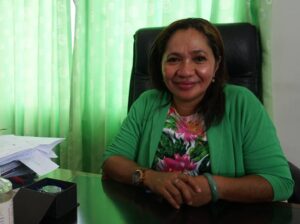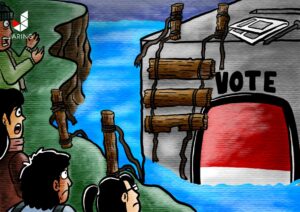Indonesia is the only country in Asia that applies a threshold of 20 percent for the presidential election, the highest threshold among other countries. According to the Director of the Asia Democracy Network (ADN), Ichal Supriadi, the nomination mechanism aims to maintain the hegemony of power in the hands of the government and the parliament. “There is no country in Asia that has a presidential threshold of 20 percent. This is just a trick to have control over power. In democratic manners, the 20 percent threshold should not be implemented,” Ichal told Jaring.id on Saturday, February 4, 2022. Below are the excerpts of the interview:
What are your criticisms of the implementation of the 20 percent threshold for the presidential election?
The threshold should not be that high. With the political structure in Indonesia, it is not possible for new parties to get sufficient space with a threshold. A presidential election with such a threshold does not open up more space for alternative candidates. It will always be stuck on the same candidates. If the threshold is lowered, maybe it will give more opportunities for political parties to determine their candidates. But 20 percent is definitely too high, let alone if the benchmark is the previous election. The system should have provided more space for anyone to participate, especially new parties or new players. If it is closed, it becomes like a political cartel. The election system should not be limited or monopolized by political parties in the parliament. The parliament must be more flexible and democratic.
What about the political mechanism for the presidential election outside Indonesia?
Only Indonesia applies the 20 percent presidential threshold. Indonesia has the highest percentage. No one has implemented it to that extent. The goal to control [power] is clear. The two political parties are afraid of competition. If they dare to compete, why should the threshold be limited to 20 percent? No country in Asia rules that the presidential threshold should be 20 percent. This is just a trick to have control over power. In democratic manners, the 20 percent threshold should not be implemented.
What is the impact of applying the 20 percent threshold?
No new party can compete in this system, let alone to become an opposition party. The party that wins the majority will form a coalition that can weaken the opposition party. We could say that the 20 percent presidential threshold will kill the opposition, thus weakening democracy. This has to be stopped or changed. If not, it will kill democracy. Democracy develops because of the presence of opposition and political equality.
In Asian countries, do they apply a threshold for the nomination of president?
The threshold is not popular in Asia. The threshold is only applied in three countries: Indonesia, the Philippines and Nepal. The applications in each of these three countries are different. In Indonesia, it is applied for the legislative election and presidential election. Unfortunately, these two elections take different samples for the threshold. The legislative election uses the actual number of votes acquired in the election. But for the presidential election, it uses the result of the previous election. In the Philippines and Nepal, the threshold applies to local elections only.
In the Asian region, the threshold system is not popular. In developed countries, such as Australia, a threshold is applied. But it does not mean that there is no risk at all. In the previous elections in Australia, the threshold was not achieved, resulting in a vacuum of political dynamics.
Why should the threshold system be applied?
The threshold was applied to bring stability to the political system. However, not all new candidates can directly compete in the election. Therefore, there should be a threshold. If the threshold is too high, it can strengthen or monopolize the political space of new candidates who wish to enter the political contest. Indeed, the threshold is not haram (forbidden under the Islamic law), but the percentage must be measured by maintaining balance and stability, in order to provide opportunities for new political players to compete.
You said that in Asia, there are not many countries applying the threshold system. Could you explain why?
For Malaysia, because it uses a professional mix system, the presidential election is considered sufficient in the parliament. The prime minister is elected by parliament. Therefore, the fight is in the parliament. It is certain that the dynamics of the development of the new party does not exist. The only political party is the coalition. In Myanmar, the prime minister is still elected by the parliament. One of the reasons that the upper threshold is not applied there is because the military is quite comfortable with their position. Therefore, they are not insistent.
What is the difference between Indonesia and neighboring countries?
One of them is because of the difference in the electoral system. The system applied in Nepal, Indonesia and the Philippines is different. In the Philippines and Nepal, there is no single political party that is very strong. Nepal, in the past year, elected three to four prime ministers. In the Philippines, it is certain that there are no political parties that maintain the presidency during two consecutive terms. They change every period. While in Indonesia, if we look at the last four periods, the Democratic Party had ruled for two periods, then continued by the coalition of PDIP that maintained their power in the next two periods. Therefore, the dominance of political parties in Indonesia is quite strong. (Abdus Somad)







